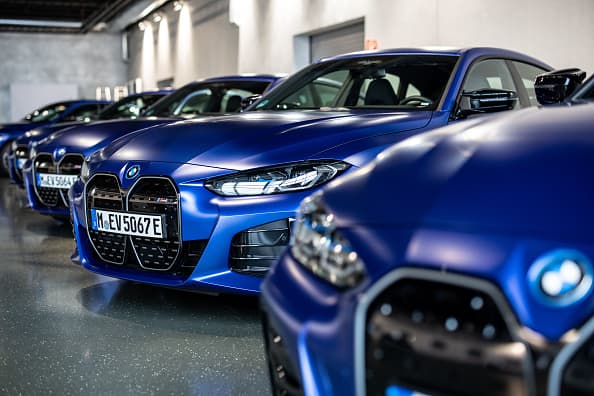BMW’s fully electric car sales on track to double this year, but still way short of Tesla

The BMW i4 seen during a BMW press event in Garching, Bavaria, on September 29, 2021.
Matthias Balk | picture alliance | Getty Images
The BMW Group’s sales of fully electric vehicles grew by 121.4% in the first nine months of 2021, hitting 59,688 units, with the German carmaker stating Wednesday that electric mobility was “becoming an increasingly vital growth driver and success factor” for the company.
In total, the Munich-headquartered firm sold 231,575 all-electric and plug-in hybrid vehicles between January and September, a jump of 98.9%. By comparison, in the third quarter of 2021 alone, Elon Musk’s Tesla says it delivered 241,300 vehicles.
BMW’s electric vehicle figures were contained in an earnings report published Wednesday. Net profit for the third quarter of 2021 amounted to 2.58 billion euros ($2.99 billion), a rise of 42.4%. This was despite deliveries in its automotive segment dropping by 12.2% compared to the third quarter of 2020.
“In the third quarter 2021, operations were increasingly impacted by supply bottlenecks for semiconductor components,” the company said. “Although this resulted in production volume shortfalls and lower sales volumes during the period from July to September 2021, the impact was more than offset by positive price effects for new and pre-owned vehicles.”
Back on the EV front, the BMW Group wants fully electric vehicles to represent at least 50% of its deliveries by the year 2030.
BMW is one of several well known companies pushing an electrification strategy. In March, Volvo Cars said it planned to become a “fully electric car company” by the year 2030.
In July, the Volkswagen Group said half of its sales were expected to be battery-electric vehicles by 2030. By the year 2040, the company said almost 100% of its new vehicles in major markets should be zero-emission.
This shift to electric mobility comes at a time when major economies around the world are attempting to reduce the environmental footprint of transportation.
The U.K., for example, wants to stop the sale of new diesel and gasoline cars and vans by 2030. It will require, from 2035, all new cars and vans to have zero tailpipe emissions.
Elsewhere, the European Commission, the EU’s executive arm, is targeting a 100% reduction in CO2 emissions from cars and vans by 2035.
— CNBC’s Chloe Taylor contributed to this report




